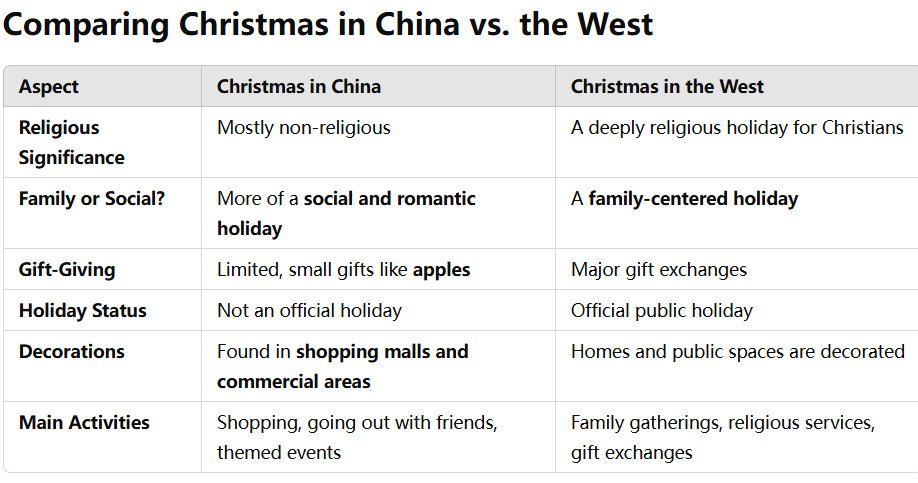Christmas Culture in Mainland China: A Growing Festive Trend
Discover how Christmas is celebrated in Mainland China, from commercial festivities to cultural adaptations. Explore how this Western holiday fits into Chinese society.
INTERESTING FACTS
Mark
12/23/20242 min read
Introduction
Christmas, a widely celebrated holiday in the West, does not hold official status in Mainland China, where Christianity is not the dominant religion. However, in recent years, Christmas has gained popularity, especially in urban areas, as a commercial and social event. Rather than being a deeply religious holiday, Christmas in China is more about shopping, entertainment, and a romantic atmosphere. This article explores how Christmas is observed in China, its adaptations, commercialization, and cultural significance.
How Christmas is Celebrated in China
1. Christmas as a Commercial Event
One of the biggest influences of Christmas in China is its commercial appeal. Similar to Western countries, shopping malls, retail stores, and online platforms use the holiday to promote sales and discounts.
Christmas Decorations in Shopping Malls: Major cities like Beijing, Shanghai, and Guangzhou feature malls decorated with Christmas trees, lights, and festive ornaments. Some stores even play Christmas music to create a holiday atmosphere.
Christmas-Themed Promotions: Many brands offer special Christmas sales, making it a major shopping event, though not as significant as Singles’ Day (November 11th).
Santa Claus Everywhere: Known in China as “Shèngdàn Lǎorén” (圣诞老人), Santa Claus is often portrayed in malls, restaurants, and advertisements, though the tradition of gift-giving is not as deeply ingrained as in the West.
2. Christmas as a Social and Romantic Holiday
Unlike Western traditions where Christmas is mainly a family holiday, in China, it has taken on a romantic and social meaning, similar to Valentine’s Day.
Young Couples’ Date Night: Many young people, especially couples, celebrate Christmas by going out for dinner, exchanging small gifts, or taking photos in decorated areas.
Christmas Eve Gatherings: Friends often gather on Christmas Eve for dinner parties, karaoke nights, or bar outings, treating it as an excuse to socialize.
Theme Park Celebrations: Places like Shanghai Disneyland and Chimelong Safari Park hold Christmas parades and events, attracting families and tourists.
3. The Unique Chinese Christmas Apple Tradition
One interesting adaptation of Christmas in China is the tradition of giving apples on Christmas Eve.
Why Apples? In Mandarin, Christmas Eve is called “Píng'ān Yè” (平安夜, Silent Night), which sounds similar to the word for apple, “píngguǒ” (苹果).
Gift-Wrapped Apples: Stores sell beautifully wrapped apples, sometimes with printed holiday messages, which are given as a symbol of peace and good luck.
Why Christmas is Not an Official Holiday in China
Despite its growing popularity, Christmas remains a non-official holiday in China for several reasons:
1. Religious Background
Christmas is a Christian holiday, and Christianity is not the dominant religion in China. With less than 5% of China’s population identifying as Christian, the religious significance of Christmas is not widely recognized.
2. Focus on Traditional Chinese Festivals
China has its own major holidays, such as Chinese New Year (Spring Festival), Mid-Autumn Festival, and National Day. These traditional celebrations hold much deeper cultural significance than Christmas.
Schools and workplaces remain open on December 25th, unlike Western countries where Christmas is a public holiday.
3. Government Regulations on Western Holidays
In recent years, some Chinese cities and schools have discouraged Christmas celebrations, encouraging people to focus more on Chinese traditions rather than Western influences.
However, Christmas celebrations in private businesses, shopping malls, and international communities continue to thrive.
Conclusion
Christmas in Mainland China has evolved into a commercial and social event, rather than a deeply religious or family-oriented holiday. It serves as a shopping festival, a romantic occasion, and a fun social experience, particularly among younger generations. While it is not an official holiday, its popularity continues to grow, driven by globalization, commercialization, and the influence of Western culture.
As China continues to modernize, it will be interesting to see how Christmas celebrations adapt and evolve in the future. For now, whether you are in China or abroad, you can still find festive lights, Santa Claus figures, and Christmas-themed promotions, adding a touch of holiday cheer to the season.


